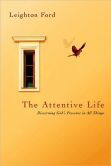 The Attentive Life (InterVarsity Press, 2008)
The Attentive Life (InterVarsity Press, 2008)
The Attentive Life is Leighton Ford’s interpretation of the “divine hours”, traditionally practiced by religious orders but originally designed by St. Benedict (The Benedictine Rule) as a guide for laypeople. Kairos, the word the Bible uses most often to speak of those opportunities that become turning points, is the most vital way to measure our lives- in contrast with chronological time. Mr. Ford emphasizes that paying attention to kairos encounters is to be fully alive. Attentiveness, however, is a difficult concept to grasp and a hard discipline to learn. Yet attentiveness is critical to finding clarity of heart, because clarity is the path to seeing God. It’s often during our darkest hours that God gets and teaches us to pay attention, so that we’re not “lost in the cosmos” but “lost in wonder”.
Vigils (also known as Matins) reminds us to pay attention to what God was doing in us long before we were born. The hour of Lauds follows, taking us from darkness and calling us to awaken to God. Prime, the next hour, is the opportunity to deliberately begin our day thoughtfully and with whole-hearted attention- to stop, look, and then go. In order to give sustained attention to the deep things of God, the hour of Terce provides time to take a midmorning break during which we focus on the Holy Spirit.
High noon in the course of hours is called Sext. Sext reminds us to pay active attention to God’s “divine interruptions” and learn from them. In None we pay attention to things the endure as we encounter the reality that things don’t last forever. Vespers is a time of renewal, not retreat, as we make fresh room for God in our hearts. The last hour, Compline, is a time to look back with gratitude and forward with trust as we week what is deepest within ourselves.

